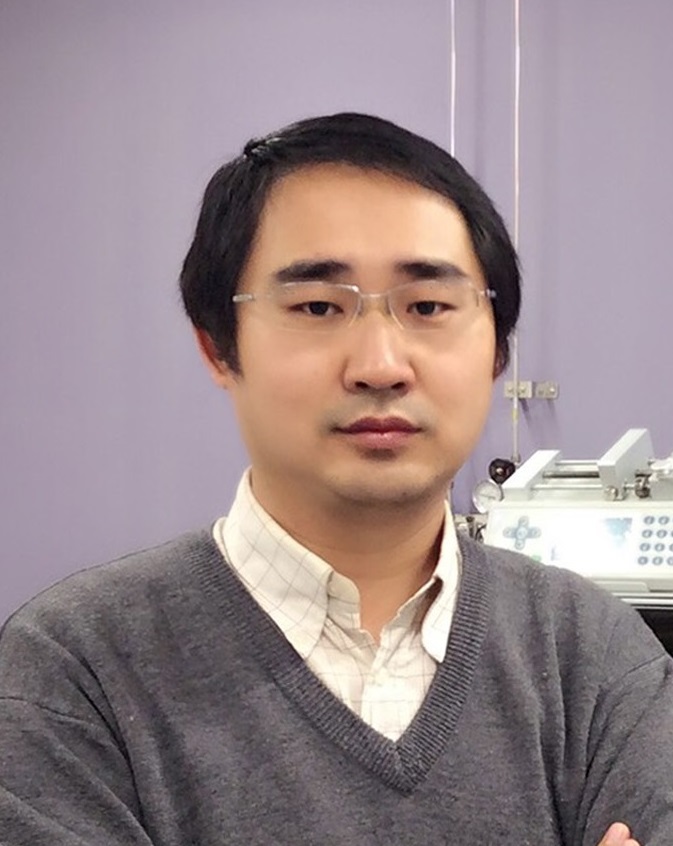Zhiqiang Wang
Phone: 86-451-86413013
Email: zhiqiang.wangmj@foxmail.com
Research Area: Sleep biology; Proteomics | 
|
|
Resume:
Educational History
Sep. 2004-Feb. 2009 Ph.D. Institute of Protein Research, Tongji University.
Professional History
Mar. 2009-Mar. 2011 Postdoctoral Fellow , Tongji University.
Apr.2011- Apr.2015 Postdoctoral Researcher , UT Southwestern.
May.2015- Aug. 2019 Researcher,WPI-IIIS, University of Tsukuba
Sep.2019- Present Principal Investigator, The HIT Center for Life Sciences (HCLS)
Research Interest:
Our research is aiming to elucidate the fundamental molecular and biochemical principles of sleep regulation. Sleep is a ubiquitous behavior among animals, however, the function and regulatory mechanism of sleep remains one of the biggest “black boxes” in modern science. I have successfully identified 80 mostly synaptic Sleep-Need-Index-PhosphoProteins (SNIPPs), accumulate/dissipate phosphorylation of which may function as the molecular substrates of sleep need. These results suggest that phosphorylation/dephosphorylation cycle of brain Sleep-Need-Index-PhosphoProteins (SNIPPs) represents a major regulatory mechanism for sleep-wake homeostasis. We also suspect that SNIPPs may constitute the molecular interface between the function of sleep “synaptic plasticity” and the regulation of sleep “homeostatic sleep need”.
By taking advantage of these new knowledges, our lab in future will try to elucidate the molecular mechanism of sleep regulation through a proteomic/genetic hybrid approach. We aim to: 1) elucidate the role of SNIPPs in sleep regulation and function in order to identify the key regulators for both sleep-wake homeostasis and sleep-dependent synaptic homeostasis; 2) draw a comprehensive mouse brain phosphorylation atlas in order to discover new molecular mechanisms of sleep regulation and function; 3) discover new generation mechanism-based sleep medicine through the mice model developed in our lab.
Publications:
Peer-reviewed Publication List
1. Zhiqiang Wang, Jing Ma, Chika Miyoshi, Yuxin Li, Makito Sato, Yukino Ogawa, Tingting Lou, Chengyuan Ma, Xue Gao, Chiyu Lee, Xiaojie Yang, Shuang Zhou, Noriko Hotta-Hirashima, Daniela Klewe-Nebenius, Aya Ikkyu, Miyo Kakizaki, Satomi Kanno, Liqin Cao, Junmin Peng, Yonghao Yu, Hiromasa Funato, Masashi Yanagisawa, Qinghua Liu. Quantitative phosphoproteomic analysis of the molecular substrates of sleep need. Nature,558, 435–439, (2018). IF: 43.769
2. Hiromasa Funato, Chika Miyoshi, Tomoyuki Fujiyama, Takeshi Kanda, Makito Sato, Zhiqiang Wang, Jing Ma, Shin Nakane, Jun Tomita, Aya Ikkyu, Miyo Kakizaki, Noriko Hotta-Hirashima, Satomi Kanno, Haruna Komiya, Fuyuki Asano, Takato Honda, Staci J. Kim, Kanako Harano, Hiroki Muramoto, Toshiya Yonezawa, Seiya Mizuno, Shinichi Miyazaki, Linzi Connor, Vivek Kumar, Ikuo Miura, Tomohiro Suzuki, Atsushi Watanabe, Manabu Abe, Fumihiro Sugiyama, Satoru Takahashi, Kenji Sakimura, Yu Hayashi, Qinghua Liu, Kazuhiko Kume, Shigeharu Wakana, Joseph S. Takahashi, Masashi Yanagisawa. Forward-genetics analysis of sleep in randomly mutagenized mice. Nature, 539, 378-383,(2016). IF: 43.769
3. Zhiqiang Wang, Shimeng Liu, Miyo Kakizaki,Yuuki Hirose, Yukiko Ishikawa, Hiromasa Funato, Masashi Yanagisawa, Yonghao Yu, Qinghua Liu. Orexin/Hypocretin activates mTOR complex 1 (mTORC1) via an Erk/Akt-independent and calcium-stimulated lysosome v-ATPase pathway.J Biol Chem,289(46): 31950-9, (2014).IF: 4.323
4. Xingjun Wang*, Zhiqiang Wang*, Yujun Wang, Xirui Huang, Yujia Hu, Ru Zhang,Margaret Ho, Lei Xue. FoxOmediatesAPP-induced AICD-dependent cell death. Cell Death Dis, 5: e1233, (2014).(*Co-First Author) IF: 6.147
5. Zhiqiang Wang, Zhimin Zhou, Zhanyun Guo, Chengwu Chi. Snapshot of the interactions between protein disulfide isomerase and HIV envelope glycoprotein 120. Acta Biochim Biophys Si, 42 (5): 358-362, (2010). IF: 2.181
6. Zhongjun Wu*, Yu Zhu, Derong Huang, Zhiqiang Wang*. Constructing the HBV-human protein interaction network to understand the relationship between HBV and hepatocellular carcinoma. Journal of Experimental & Clinical Cancer Research, 29:146, (2010). (*Corresponding Author) IF: 4.59
7. Zhiqiang Wang, Yuhong Han, Xiaoxia Shao, Chengwu Chi, Zhanyun Guo. Molecular cloning, expression and characterization of protein disulfide isomerase from Conus marmoreus.FEBS Journal, 274 (18): 4778-4787, (2007). IF: 4.129
8. Yibing Wang, Liqin Cao, Chia-Ying Lee, Tomohiko Matsuo, Kejia Wu, Greg Asher, Lijun Tang, Tsuyoshi Saitoh, Jamie Russell, Daniela Klewe-Nebenius, Li Wang, Shingo Soya, Emi Hasegawa, Yoan Chérasse, Jiamin Zhou, Yuwenbin Li, Tao Wang, Xiaowei Zhan, Chika Miyoshi, Yoko Irukayama, Jie Cao, Julian P. Meeks, Laurent Gautron, Zhiqiang Wang, Katsuyasu Sakurai, Hiromasa Funato, Takeshi Sakurai, Masashi Yanagisawa, Hiroshi Nagase, Reiko Kobayakawa, Ko Kobayakawa, Bruce Beutler, Qinghua Liu. Large-scale forward genetics screening identifies Trpa1 as a chemosensor for predator odor-evoked innate fear behaviors. Nature Communication, 9:2041, (2018). IF: 13.092
9. Haoming Liu, Chunyang Liang, Rahul K. Kollipara, Masayuki Matsui, Xiong Ke, Byung-Cheon Jeong, Zhiqiang Wang, Kyoung Shin Yoo, Gaya P. Yadav, Lisa N. Kinch, Nicholas V. Grishin, Yunsun Nam, David R. Corey, Ralf Kittler, Qinghua Liu.HP1BP3, a Chromatin Retention Factor for Co-transcriptional MicroRNA Processing. Molecular Cell, 63, 1–13, (2016). IF: 14.37
10. Mi Zhou, Zhiqiang Wang*. Advances in drug delivery across the blood-brain barrier. Life Science Research, 13(4): 370-376, (2009). (*Corresponding Author)
11. Zhiqiang Wang, Zhimin Zhou, Zhanyun Guo. The structure and function of the protein disulfide isomerase family.Life Science Research, 13(6): 548-553, (2009).
12. Weihua Chen, Zhiqiang Wang, Yuhong Han. The progress in studies on A-superfamily conotoxins. Chinese Bulletin of Life Sciences, 18(4): 373-379, (2006).